Caroline Leavitt's Blog, page 31
April 11, 2017
Sonia Taitz talks about how being the child of Holocaust survivors let her mix humor with heartbreak, not having it all, and grappling for the first time with a real legal plot
<!-- /* Font Definitions */ @font-face {font-family:Times; panose-1:2 0 5 0 0 0 0 0 0 0; mso-font-alt:Times; mso-font-charset:0; mso-generic-font-family:auto; mso-font-pitch:variable; mso-font-signature:3 0 0 0 1 0;} @font-face {font-family:"MS 明朝"; mso-font-charset:78; mso-generic-font-family:auto; mso-font-pitch:variable; mso-font-signature:-536870145 1791491579 18 0 131231 0;} @font-face {font-family:"Cambria Math"; panose-1:2 4 5 3 5 4 6 3 2 4; mso-font-charset:0; mso-generic-font-family:auto; mso-font-pitch:variable; mso-font-signature:-536870145 1107305727 0 0 415 0;} @font-face {font-family:Calibri; panose-1:2 15 5 2 2 2 4 3 2 4; mso-font-charset:0; mso-generic-font-family:auto; mso-font-pitch:variable; mso-font-signature:-520092929 1073786111 9 0 415 0;} @font-face {font-family:Cambria; panose-1:2 4 5 3 5 4 6 3 2 4; mso-font-charset:0; mso-generic-font-family:auto; mso-font-pitch:variable; mso-font-signature:-536870145 1073743103 0 0 415 0;} /* Style Definitions */ p.MsoNormal, li.MsoNormal, div.MsoNormal {mso-style-unhide:no; mso-style-qformat:yes; mso-style-parent:""; margin:0in; margin-bottom:.0001pt; mso-pagination:widow-orphan; font-size:12.0pt; font-family:Cambria; mso-ascii-font-family:Cambria; mso-ascii-theme-font:minor-latin; mso-fareast-font-family:"MS 明朝"; mso-fareast-theme-font:minor-fareast; mso-hansi-font-family:Cambria; mso-hansi-theme-font:minor-latin; mso-bidi-font-family:"Times New Roman"; mso-bidi-theme-font:minor-bidi;} .MsoChpDefault {mso-style-type:export-only; mso-default-props:yes; font-family:Cambria; mso-ascii-font-family:Cambria; mso-ascii-theme-font:minor-latin; mso-fareast-font-family:"MS 明朝"; mso-fareast-theme-font:minor-fareast; mso-hansi-font-family:Cambria; mso-hansi-theme-font:minor-latin; mso-bidi-font-family:"Times New Roman"; mso-bidi-theme-font:minor-bidi;} @page WordSection1 {size:8.5in 11.0in; margin:1.0in 1.25in 1.0in 1.25in; mso-header-margin:.5in; mso-footer-margin:.5in; mso-paper-source:0;} div.WordSection1 {page:WordSection1;} </style><br /><div class="MsoNormal" style="background: white; margin-bottom: 12.0pt;"><div class="separator" style="clear: both; text-align: center;"><a href="https://2.bp.blogspot.com/-5aQSQwAYjw..." imageanchor="1" style="margin-left: 1em; margin-right: 1em;"><img border="0" height="320" src="https://2.bp.blogspot.com/-5aQSQwAYjw..." width="213" /></a></div><br /><div class="separator" style="clear: both; text-align: center;"><a href="https://3.bp.blogspot.com/-nPlJ2R9-ry..." imageanchor="1" style="margin-left: 1em; margin-right: 1em;"><img border="0" height="320" src="https://3.bp.blogspot.com/-nPlJ2R9-ry..." width="256" /></a></div><br /></div><div class="MsoNormal" style="background: white; margin-bottom: 12.0pt;"><i><a href="http://www.soniataitz.com/">S... Taitz</a> is the kind of person who ALWAYS shows up at your readings, who calls you with opportunities, and best of all, who listens with an open heart and great advice. Of course, she's my friend and I'm delighted to host her here for GREAT WITH CHILD. She's the author of the critically acclaimed novels, The Watchmaker's Daughter, Mothering Heights, In the King's Arms (nominated for the Sami Rohr Prize in Fiction, Down Under and now Great With Child.</i><br /><i><br /></i><i>I'm so delighted to have her, here. Thank you so much, Sonia!</i></div><br /><br /><b>I always think something is haunting an author to get them writing a certain book. Sonia Was it that way for you?</b><br />It’s the conflict between mind and heart. All my life, I’ve wondered about how people become “professionalized” in certain careers. In law school, which I started at the relatively young age of 21, we were promptly and efficiently taught to “think like lawyers.” In some ways, that meant leaving behind my personal way of relating to the world. When I became a mother, the personal, the unique, the precious, and the loving became more important to me than brains, status, and money. That conflict is front and center in Great With Child.<br /><b><br />Great With Child does this wonderful alchemy--mixing humor with heartbreak. Would you say that is the way you live your life, too?</b><br />Yes. I think it has something to do with my being the child of Holocaust survivors. Both my parents could find humor in life’s low points, and often did. All my books share this combination of the funny and the tragic. My memoir of growing up as a first-generation American, The Watchmaker’s Daughter is especially bittersweet. I’m always flattered when people say that cry and laugh out loud when they read it. It’s a tribute to my upbringing in a house marked by tragedy, with people who overcame their past with perspective, grit – and sparkle.<br /><b><br />Motherhood is a hot button issue still, with more and more women saying they don't want to be mothers at all now, because you can't have it all. But I always think, well, maybe all isn't what you really need. Can you talk about this please?</b><br /><br />The very idea of “having it all” changed for me with motherhood. The massive ego I was burdened with pre-babies magically lifted when I started to love others more than myself. I’m also lucky to have turned from law – which is still, largely, a man’s world of pressured, billable hours and rigid rules – to writing, which can more easily accommodate a parent’s schedule.<br /><br /><b>I always think that a new book is so different from the last one any writer does. What surprised you in writing Great With Child? </b><br /><br />This is one of my only books that has a real legal plot. The others deal with more basic issues like good and bad, men and women, native and outsider. While Great With Child does share a philosophical underpinning – and does deal with good/bad, men/women, native/outsider—it is the most “story-telling” of my books, with a whirlwind pace.<br /><br /><b>What's obsessing you now and why?</b><br /><br />I’m re-reading dystopian books like Brave New World and 1984, because I’m worried that the kindness and humanity that I’ve come to expect in America (and appreciate as the daughter of immigrants) is waning. America as a refuge is an ideal to me, and I want its heart to remain open.<br /><b><br />What question didn't I ask that I should have?</b><br /><br />Do I think I’m lucky to be a writer? It’s a hard life in some respects: isolated, needing the discipline of a self-imposed schedule, and guaranteeing no sure outcome. You put your heart and essence into something, and send it out, naked, into the world. But I find that writing, like parenting, is one of the most loving callings. You do it to give and to share what is the best of you, born of birthing pains that no epidural can mask. What makes it worthwhile? The chance that you may have enriched the world in the end, or even just one person in it. <br /><div class="MsoNormal" style="background: white;"><br /></div><div class="MsoNormal" style="background: white;"><br /></div><div class="MsoNormal"><br /></div><div class="MsoNormal" style="background: white;"><br /></div><div class="MsoNormal"><br /></div><div class="MsoNormal"><br /></div>
Published on April 11, 2017 10:00
Yewande Omotoso talks about The Woman Next Door, cranky old ladies, the "beautiful beast" of writing, and so much more
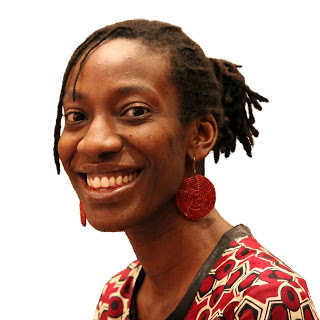
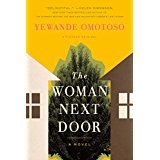
I was so thrilled to meet Yewande Omotosoas in person at a Book Fest, and I chose this photo because I fell in love with her earrings as soon as I saw them! Funny, smart and warm, she was born in Barbados and grew up in Nigeria, moving to South Africa with her family in 1992. She is the author of Bom Boy, published in South Africa in 2011. In 2012 she was on the South African Literary Award for First-Time Published Author and was shortlisted for the South African Sunday Times Fiction Prize. In 2013 she was a finalist in the the inaugural, pan-African Etisalat Fiction Prize along with NoViolet Bulawayo and Karen Jennings. She lives in Johannesburg.
Thank you so much for being here, Yewande!
I always think authors are haunted by something before they start writing a book. What was haunting you with the Woman Next Door?
Many things! I was around my grandmother just after my grandfather died and it got me thinking about what it is to be of that age, late 70s, 80s, to have so much of your life behind you. And then I began to dwell on that more. I wondered in particular what it might be like to be in the last years of a life that has largely been unfulfilling. The sense that the quality of the life you have lived will have some bearing on your experience of these final years. I wondered how late is too late - for friendship, for redemption.
I loved these two cranky old ladies feuding and then finding just enough of a chip of light to find something in common. Was there ever a moment in the book when you didn't think this would happen for them?
I didn't take it for granted that it would but I understood that part of the project of writing the book was to sit with this question on every page, to wonder it as I wrote their stories. I had to really balance this. I couldn't lie about what is possible for two such women but I also felt nervous about the likelihood of discovering - as the writer - that nothing is possible. I wasn't sure what would happen. And, in a strange way, I'm still not certain.
What kind of writer are you? Do you wait for that pesky muse or do you map things out? What surprises you each and every time you sit down to write?
I'm someone who finds life, as it is, immensely inspiring as it is devastating, and so there is never a sense of waiting for a muse. I don't map things out so much as follow scent, like being a tracker and the story is a kind of beautiful beast. Along the way you lose it find it, find it's droppings. Ultimately I think it's right that the beast stays wild (perhaps in the forests of our imaginations) so the novel then is as close an approximation (a rendering) as possible. The story surprises me - this is very important. If, at the beginning of my creative process, I map the whole thing out and understand what happens from start to end I stop writing.
What's obsessing you now and why?
The body. And representation of the body especially in visual art. Death is also obsessing me. And seeing the family unit as a project, what sustains it, what scuppers it. I think the things that we obsess over are embedded into our psyches and produce from there, entwined in the material of our experiences, our longing - who knows?
What question didn't I ask that I should have?
These are great questions - the question monster is for now satiated. Thanks so much.
Published on April 11, 2017 09:53
Whiting Award winner (yeah!) Kaitlyn Greenidge talks about We Love You, Charlie Freeman, sign language, more--and the novel is now in paperback!
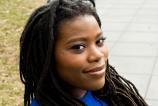
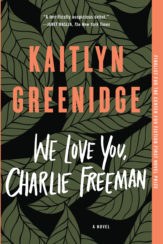
Oh yes, I am partial to other Algonquin writers, and I especially loved Kaitlyn Greenidge's We Love You Charlie Freeman--and so does everyone else. I was so happy to run into Kaitlyn at various book events, and I wanted to host her on my blog--and here she is! Kaitlyn Greenidge received her MFA from Hunter College, where she studied with Nathan Englander and Peter Carey, and was Colson Whitehead’s writing assistant as part of the Hertog Research Fellowship. Greenidge was the recipient of the Bernard Cohen Short Story Prize. She was a Bread Loaf scholar, a Lower Manhattan Cultural Council Workspace artist-in-residence, and a Johnson State College visiting emerging writer. Thank you so much for being here, Kaitlyn!
Recently, you won a Whiting Award! (Huge congratulations) Does it make it harder or easier for you to write your next book? Do you feel the pressure of expectations or the relief or already having arrived in the literary stratosphere?
Ha, I don't think I'm in any stratosphere. I am overwhelmed by the attention the book has gotten, but it doesn't change that I am still struggling with the next one and that trying to work on it is usually interrupted by doing dishes, doing laundry, grading papers, prepping for class, writing for others and all the other things in life that get in the way of just focusing on working on a novel.
What was your research like for the book? What surprised you about it?
I had a good time researching. I like libraries and I love to research. I think I was surprised that research mattered for a long time and then ultimately didn't. That it was just as important to be able to imagine things as it was to verify if something was possible. I had forgotten, in my excitement to do research, that that is kind of the point of writing fiction, and not just a history book.
I loved all the part about sign language, and at a recent panel with you, the moderator mentioned that there are actually different dialects in sign language. This fascinates me so much! Can you talk about that please for the blog readers?
Sure. Sign language, like all languages, has dialects, which I found fascinating as well. There's African American Sign language, a result of segregated schools for the deaf. As I've toured with the book, I've gotten to hear about others--apparently there is a dialect specific to gay men, and regional dialects too. It's fascinating.
What's obsessing you now and why?
Goddess worship and dictionaries of symbols. Mostly because I just like both those things so much.
What question didn't I ask that I should have?
These questions were great!
Published on April 11, 2017 09:48
April 10, 2017
What makes a marriage last? Dani Shapiro talks about her luminous memoir Hourglass, how time alters us and our memories, and so much more
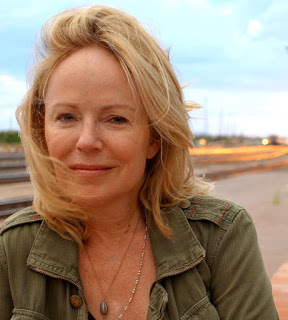
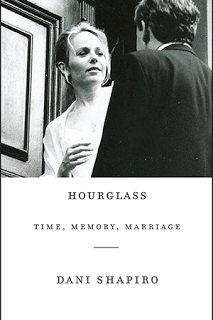
I can't remember when or where I first met Dani Shapiro, only that it was--and still is--absolutely remarkable. I remember the last time I saw her, at a book fest, and we grabbed a quiet spot and just talked and talked and it felt like every secret I had ever had was revealed, and it was safe. She's funny, smart, deeply thoughtful, and I need to go have tea with her as soon as possible!
Dani is not just a wonderful person, but she's also the bestselling author of the memoirs Still Writing, Devotion, and Slow Motion, and five novels including Black & White and Family History. Her work has appeared in The New Yorker, Granta, Tin House, One Story, Elle, The New York Times Book Review, the op-ed pages of The New York Times, The Los Angeles Times, and has been broadcast on “This American Life”. Dani was recently Oprah Winfrey’s guest on”Super Soul Sunday.” She has taught in the writing programs at Columbia, NYU, The New School and Wesleyan University; she is co-founder of the Sirenland Writers Conference in Positano, Italy. A contributing editor at Condé Nast Traveler, Dani lives with her family in Litchfield County, Connecticut.
This memoir is so rich and real, and also so brave—was there any time when you were afraid of what you were writing? Did anything surprise you about it?
Oh my god, where do I begin. I was terrified for much of the time I wrote Hourglass. All books are – or should be – scary to write, but this one was different for me because it felt like such a high-wire act. I was writing from within my own marriage. My own happy marriage of 20 years, which is also to say, my own complicated, imperfect marriage as all long marriages are. It was a book I felt absolutely compelled to write – I wanted to explore what it means to be two people going through time together – but the whole time I was writing it, I wondered if I had lost my mind. One thing that surprised me was that it was clear to me, from early in the writing, that this would be a slim volume, as they say. It felt like a book that wanted to be read in one or two breaths, or at least that’s the way I thought of it.
Hourglass is a portrait of a marriage that lasts—and changes amidst success, aging, illness, and having a child. So, how did writing this exquisite memoir change your marriage yet again?
Writing Hourglass allowed me to see certain strengths and certain fault lines in my marriage more clearly than I ever had before. It’s a very interesting exercise to put one’s marriage under a microscope, the way I did in this book. Not for the faint of heart! But it only has brought my husband and me closer together. He’s also a writer, and is my first reader. He read every page as I wrote, and if he were to have said to me, I’d rather you didn’t – well then I wouldn’t have. My marriage is more important to me than any book. Is that okay to say? I hope it doesn’t make me less of an artist. My family and their well-being comes first.
I’m fascinated that you said that you were done with telling stories, that you want the truth—but don’t you feel that the way we make sense of our lives is often in making our lives a story to ourselves, finding that arc, superimposing meaning?
Absolutely we’re always telling stories, always superimposing meaning. But the older I get, the more I see that the stories change, our memories change, that nothing is fixed. It’s why writing multiple memoirs is possible. All the writer is doing is pinning that precise moment between the pages of a book. Nothing more. I’ve become fascinated with the kind of narratives that attempt to inhabit a consciousness, rather than tell a story. Not that I’m not interested in stories! But I am more interested in what drives them.
What really got me in your moving memoir was, well—love. There is something very different about being in a long term loving relationship than those first heady days of passion—and I think the long marriage, the going through difficult times together is what truly makes a union. Do you agree? Can you talk about this please?
When I finished the book and early readers began to describe it to me as a “very grown-up love story” nothing made me happier. Because, yes, I knew I was writing out of love, but the kind of clear-eyed, intimate, going-through-it-all-together kind of love that isn’t about hearts and flowers and cueing the violin. I look at my husband sometimes and think: we have gone through terrifying things together. The near-loss of our only child; the illnesses and deaths of parents; financial fears; successes and disappointments. The whole megillah, the whole human catastrophe. This only makes me love him more.
What’s obsessing you now and why?
As I think Hourglass makes abundantly clear, I’m obsessed with time, and have been for the past ten years or so. How does time alter us? How does time chisel away at us? How does time move? In a circle? A spiral? A straight line? Are all the people we’ve ever been still alive somewhere within us? And then, well, obviously the state of the world. But I try to put brackets around that obsession so I can get work done.
What question didn’t I ask that I should have?
Um… maybe, when are you going to put on your red cowboy boots and go out on the town with me?
Published on April 10, 2017 19:15
April 5, 2017
Anne Lamott talks about her new book, Hallelujah Anyway, why it's important to flirt with old people, how mercy can change the world, how to fail better, and so much more
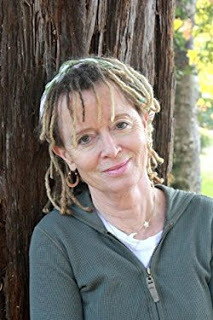
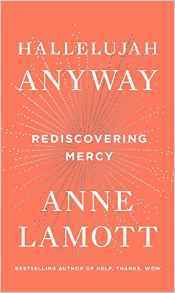
First up, I have two wonderful Anne Lamott stories I have to tell. The first was over 20 years ago, when I had lost a baby three and a half months into my pregnancy and very unhelpful people were saying things to me like, "Well, at least you didn't know the baby yet." I cried a lot. I don't know why but I got it into my head that Anne Lamott would understand. I didn't know her but I tracked her down and wrote her a letter and I felt better, never expecting a reply. But one day, a few weeks later, I cam ehome to find a smoky voice in my messages, soothing, calming, making me laugh. It was her.
Fast forward to a few years ago. Over the years, we've emailed. Anne interviewed me for my novel Pictures of You, and then I got a chance to interview her. I was, I admit, a little scared, but I got in her limo and the first thing she did was rifle through her purse and take out half a peanut butter sandwich. "You hungry?" she asked. Then she asked me how I could see without glasses because she couldn't see a bloody thing..
How could you not love a person like that? She makes you feel like you are home--and not in your old dysfunctional home, but your new home, where everyone takes care of everyone else and showers you with attention.
Annie is also the New York Times bestselling author of Help, Thanks, Wow; Small Victories; Stitches; Some Assembly Required; Grace (Eventually); Plan B; Traveling Mercies; Bird by Bird; Operating Instructions, and the forthcoming Hallelujah Anyway. She is also the author of several novels, including Imperfect Birds and Rosie. A past recipient of a Guggenheim Fellowship and an inductee to the California Hall of Fame, she lives in Northern California.
Annie--thank you, thank you, thank you, thank you. Love, Caroline.
Ha, ha, I’m about to ask “why now? Why this book now?” but I certainly know the answer and how deeply a book like this is needed, but I want to ask you anyway. And why do so many people resist mercy, kindness and all the great nouns?
It's always a great time for mercy. It is always hard here on earth, and in our heads. It's so easy to get caught up in the culture's manic, competitive energy, and to forget that there is nothing out there that can fill the Swiss Cheesey holes inside. So to begin by offering welcome and kindness to our annoying, disappointing selves can begin a transformation of believing there is kindness and mercy within us and all around us.
I wrote this book during the year when I thought 100% that Hillary would be president, so I wasn't thinking of the bizarre fever dream of the Trump presidency, but ay-yi-yi, I double down on everything I said in the book.
What little acts of mercy can people do every day? I love the whole notion of radical kindness. Can it be as simple as telling a very old lady that her hat is gorgeous? (Because no one pays attention to very old ladies, but you can…)
My Sunday school kids came up with a Lent contract, because we talked about how easy it is to be kind and forgiving to other people, but how hard we are on ourselves. So:
1) be friendly with yourself.
2) Fill a box with art supplies for children, to take to thrift shops and homeless shelters. Then take the time to ask the kids their teacher's name, and to tell you about their best friend.
3) Flirt with old people. Tell at least one old person everyday that you love their clothes, purse, or pet.
Tell me about the title, the “anyway” added to Hallelujah?
It's the name of a gospel song I love. Trump is president, my feet hurt, my kid is scaring me, I loose my ATM card....but Hallelujah Anyway. We have each other, some food and cool water, a book I can't wait to start, and the sky is always so beautiful.
I’m deeply curious about how you wrote this particular book. Did you make discoveries as you wrote, or had you already been pondering the question of mercy for so long that you had to just spill the words onto the page? Did anything surprise you.
Even way before Trump, I could see how frightened people felt about the world, how hostile and dangerous the world is, our country is, how scared for our kids. But I noticed that if I said the word mercy, or merciful, it would change people's whole day, to remember each other's good hearts exuding sweetness and generosity, no matter how unpleasant the "outside" world.
At one point you write, that “every species on earth has to be a little afraid in order to live.” But do you think, in some way, that fear is testing us to be our best selves, to come to our best solutions, to step out and try something? And isn’t there also the fear of having something incredible that we want—like love—and having it taken away from us?
My only fears are that something will happen to my son or grandson. I could lose everything, if they could be okay. I have, at various times, lost just about everything, but I have come through, by the love of my closest people(and what I would call grace, or Goodness, or some sort of spiritual WD-40. So when I am afraid, I notice how many dire consequences I'm spinning in my head, like cotton candy, that I just made up, because of my fear of the unknown AND POSSIBLY CATASTROPHIC. So I change mental channels to what I know, which is that I am never alone, in the love of my pit crew, my higher power, and my own radical self-care.
I also loved your comment that sometimes, instead of trying to be “better” people, we should try to be worse. That means, not always saying yes, when you want to stay home and read, not agreeing to things so people will think you are nice, etc. Can you talk about this please?
Oh, that's from the Day of Atonement section of HA. We've all been half ruined by our perfectionism, our ceaseless striving to be better and more impressive, and above all, to not make any mistakes. So it's wonderful to encourage each other to screw up more, be MORE vulnerable, MORE human. And that's where all good writing comes from--messy piles of notes, false starts, shitty first drafts. Like Samuel Becker said "Ever tried, ever failed. Try again, fail again; fail better.
What’s obsessing you now and why? (Ha, ha, again, I think I know the answer!)
Publication! The Amazon Sales rankings. How many desserts I've been eating on book tour. Let's see, what else? Oh--how many months till impeachment proceedings begin.
What question didn’t I ask that I should have?
Oh, you did a great job. I love talking to you, and the people at your blog. xoxo and God bless you GOOD!
Published on April 05, 2017 15:10
March 31, 2017
Want to know a fantastic book festival to go to? Long Island's Word Up Lit Festival is amazing and award-winning author, journalist and founder Claudia Gryvatz Copquin is here to talk about it
<!-- /* Font Definitions */ @font-face {font-family:Times; panose-1:2 0 5 0 0 0 0 0 0 0; mso-font-alt:Times; mso-font-charset:0; mso-generic-font-family:auto; mso-font-pitch:variable; mso-font-signature:3 0 0 0 1 0;} @font-face {font-family:"MS 明朝"; mso-font-charset:78; mso-generic-font-family:auto; mso-font-pitch:variable; mso-font-signature:-536870145 1791491579 18 0 131231 0;} @font-face {font-family:"Cambria Math"; panose-1:2 4 5 3 5 4 6 3 2 4; mso-font-charset:0; mso-generic-font-family:auto; mso-font-pitch:variable; mso-font-signature:-536870145 1107305727 0 0 415 0;} @font-face {font-family:Cambria; panose-1:2 4 5 3 5 4 6 3 2 4; mso-font-charset:0; mso-generic-font-family:auto; mso-font-pitch:variable; mso-font-signature:-536870145 1073743103 0 0 415 0;} /* Style Definitions */ p.MsoNormal, li.MsoNormal, div.MsoNormal {mso-style-unhide:no; mso-style-qformat:yes; mso-style-parent:""; margin:0in; margin-bottom:.0001pt; mso-pagination:widow-orphan; font-size:12.0pt; font-family:Cambria; mso-ascii-font-family:Cambria; mso-ascii-theme-font:minor-latin; mso-fareast-font-family:"MS 明朝"; mso-fareast-theme-font:minor-fareast; mso-hansi-font-family:Cambria; mso-hansi-theme-font:minor-latin; mso-bidi-font-family:"Times New Roman"; mso-bidi-theme-font:minor-bidi;} .MsoChpDefault {mso-style-type:export-only; mso-default-props:yes; font-family:Cambria; mso-ascii-font-family:Cambria; mso-ascii-theme-font:minor-latin; mso-fareast-font-family:"MS 明朝"; mso-fareast-theme-font:minor-fareast; mso-hansi-font-family:Cambria; mso-hansi-theme-font:minor-latin; mso-bidi-font-family:"Times New Roman"; mso-bidi-theme-font:minor-bidi;} @page WordSection1 {size:8.5in 11.0in; margin:1.0in 1.25in 1.0in 1.25in; mso-header-margin:.5in; mso-footer-margin:.5in; mso-paper-source:0;} div.WordSection1 {page:WordSection1;} </style> <br /><div class="MsoNormal" style="margin-bottom: 12.0pt; mso-margin-top-alt: auto;"><br /><br /><br /><table align="center" cellpadding="0" cellspacing="0" class="tr-caption-container" style="margin-left: auto; margin-right: auto; text-align: center;"><tbody><tr><td style="text-align: center;"><a href="https://2.bp.blogspot.com/-jqmRB3zBzU..." imageanchor="1" style="margin-left: auto; margin-right: auto;"><img border="0" height="320" src="https://2.bp.blogspot.com/-jqmRB3zBzU..." width="320" /></a></td></tr><tr><td class="tr-caption" style="text-align: center;">The phenomenal Claudia Copquin runs the Word Up Festival</td></tr></tbody></table><br /><br /><br /><br /><table align="center" cellpadding="0" cellspacing="0" class="tr-caption-container" style="margin-left: auto; margin-right: auto; text-align: center;"><tbody><tr><td style="text-align: center;"><a href="https://2.bp.blogspot.com/-bJnt3ZsZ7n..." imageanchor="1" style="margin-left: auto; margin-right: auto;"><img border="0" height="213" src="https://2.bp.blogspot.com/-bJnt3ZsZ7n..." width="320" /></a></td></tr><tr><td class="tr-caption" style="text-align: center;">I was so happy to be here!</td></tr></tbody></table><br /><span style="font-family: "times"; font-size: 10.0pt;">There are tons of book festivals, but what I loved about <a href="http://www.longislandlitfest.com/&quo... Up </a>was that it was all in one huge auditorium, so whether your were Gail Sheedy or Dave Barry, Barry Dougherty, Alan Zweibel, Cathi Hanauer, or me...we all had the same huge audience. How great is that? I fell in love with <a href="http://www.claudiacopquin.com/"&... Gryvatz Copquin</a>, an award-winning journalist, author and book lover, who was on top of every detail, even with her arm in a sling, and she's here to talk to us about the fest.</span><br /><br /><br /><span style="font-family: "times"; font-size: 10.0pt;"><b>What gave you the idea for Word Up? How difficult was it to bring it together?</b><span style="color: #1f497d;"><b> </b><br />As an avid reader, I’ve been to literary festivals and book fairs and was always questioning why we didn’t have these on Long Island. We have great indie bookstores and libraries, so I know there are other readers here, as well as people who want to meet authors and see them reading their works on a stage. Also, a few of my writer friends and I had begun touring around Long Island, Manhattan and even Brooklyn, reading our personal essays under the name, “Living, Out Loud: Writers Riff on Love, Sweat & Fears.” Those readings were very well received, so that was the impetus for creating a larger forum and a broader event, which became Word Up: Long Island LitFest. The first year we were strictly a non-fiction event, but we have since opened it up to fiction, so our audiences could enjoy seeing writers like you! In terms of difficulty, I have an amazing and giving Advisory Board on hand. But this is really a labor of love so I enjoy the whole challenge of putting together a festival each year. </span></span></div><div class="MsoNormal" style="margin-bottom: 12.0pt; mso-margin-top-alt: auto;"><span style="font-family: "times"; font-size: 10.0pt;"><b>I was amazed at the crowd, and the warmth and the camaraderie of everyone. How did that come about so easily?</b><span style="color: #1f497d;"><b> </b><br />That’s organic. The audience is well read and cultured and interested in ideas and so they really appreciate this unique event on Long Island. I think the vibe also comes from our motto: This is a day to disconnect from gadgets and connect with each other via the written and spoken word. </span></span></div><div class="MsoNormal" style="margin-bottom: 12.0pt; mso-margin-top-alt: auto;"><span style="font-family: "times"; font-size: 10.0pt;"><b>What is the best experience you've had from Word Up?</b><span style="color: #1f497d;"> <br /><br />There are so many! Of course, it’s a thrill for me to meet authors and get to schmooze with them all day behind-the-scenes. These are my heroes, so what a perk! But I also really value audience input. People stop me in the lobby at LitFest and tell me face-to-face what a great time they are having, and how fantastic it is to have this event going on and how great the authors are – that immediate feedback is priceless, and is what keeps me going! </span></span></div><div class="MsoNormal" style="margin-bottom: 12.0pt; mso-margin-top-alt: auto;"><span style="font-family: "times"; font-size: 10.0pt;"><b>Can I ask what was the worst?</b><span style="color: #1f497d;"> <br /><br />Sure. I think the worst was our first year. Dick Cavett was our keynote and we had Susan Isaacs, Arlene Alda, Henry Alford, Julie Klam and other incredibly talented writers, and it took place at the end of May. Well, we were in a historic castle on the North Shore of Long Island and the air conditioner broke. There was about 120% humidity that day and the venue didn’t have enough fans on hand so you can imagine the angst…..</span></span></div><div class="MsoNormal" style="margin-bottom: 12.0pt; mso-margin-top-alt: auto;"><span style="font-family: "times"; font-size: 10.0pt;"><b>What's obsessing you now and why</b>?<span style="color: #1f497d;"> </span></span><br /><span style="font-family: "times"; font-size: 10.0pt;"><span style="color: #1f497d;"><br />Do you mean in general or in regards to Long Island LitFest? In general, I’m obsessed with the news. Where are we heading …?? In regards to LitFest, I’m obsessed with starting the process all over again of booking best-selling authors for LitFest 2018! </span></span></div><div class="MsoNormal" style="margin-bottom: 12.0pt; mso-margin-top-alt: auto;"><span style="font-family: "times"; font-size: 10.0pt;"><b>What question didn't I ask that I should have!</b><span style="color: #1f497d;"><b> </b> </span></span><br /><br /><span style="font-family: "times"; font-size: 10.0pt;"><span style="color: #1f497d;">Well, I want to include that in addition to our signature event, a full day of author readings, book signings and workshops, we also host single-author events throughout the year under “Long Island LitFest Presents…” In November we hosted Wally Lamb and in December Alice Hoffman. We are hosting Anna Quindlen on June 8 at Cinema Arts Centre in Huntington and there will be more as the year progresses so I invite your readers to subscribe to our website for up-to-date info on these great events. </span></span></div>
Published on March 31, 2017 08:20
March 30, 2017
Hannah Lillith Assadi talks about Sonora, coming of age in both the desert and New York City, love, sex, and so much more
<!-- /* Font Definitions */ @font-face {font-family:Arial; panose-1:2 11 6 4 2 2 2 2 2 4; mso-font-charset:0; mso-generic-font-family:auto; mso-font-pitch:variable; mso-font-signature:-536859905 -1073711037 9 0 511 0;} @font-face {font-family:"Cambria Math"; panose-1:2 4 5 3 5 4 6 3 2 4; mso-font-charset:0; mso-generic-font-family:auto; mso-font-pitch:variable; mso-font-signature:-536870145 1107305727 0 0 415 0;} @font-face {font-family:Calibri; panose-1:2 15 5 2 2 2 4 3 2 4; mso-font-charset:0; mso-generic-font-family:auto; mso-font-pitch:variable; mso-font-signature:-520092929 1073786111 9 0 415 0;} /* Style Definitions */ p.MsoNormal, li.MsoNormal, div.MsoNormal {mso-style-unhide:no; mso-style-qformat:yes; mso-style-parent:""; margin-top:0in; margin-right:0in; margin-bottom:8.0pt; margin-left:0in; line-height:107%; mso-pagination:widow-orphan; font-size:11.0pt; font-family:Calibri; mso-ascii-font-family:Calibri; mso-ascii-theme-font:minor-latin; mso-fareast-font-family:Calibri; mso-fareast-theme-font:minor-latin; mso-hansi-font-family:Calibri; mso-hansi-theme-font:minor-latin; mso-bidi-font-family:"Times New Roman"; mso-bidi-theme-font:minor-bidi;} .MsoChpDefault {mso-style-type:export-only; mso-default-props:yes; font-size:11.0pt; mso-ansi-font-size:11.0pt; mso-bidi-font-size:11.0pt; font-family:Calibri; mso-ascii-font-family:Calibri; mso-ascii-theme-font:minor-latin; mso-fareast-font-family:Calibri; mso-fareast-theme-font:minor-latin; mso-hansi-font-family:Calibri; mso-hansi-theme-font:minor-latin; mso-bidi-font-family:"Times New Roman"; mso-bidi-theme-font:minor-bidi;} .MsoPapDefault {mso-style-type:export-only; margin-bottom:8.0pt; line-height:107%;} @page WordSection1 {size:8.5in 11.0in; margin:1.0in 1.0in 1.0in 1.0in; mso-header-margin:.5in; mso-footer-margin:.5in; mso-paper-source:0;} div.WordSection1 {page:WordSection1;} </style> <br /><div class="MsoNormal" style="background: white; line-height: normal; margin-bottom: 12.0pt;"><span style="font-family: "arial" , "helvetica" , sans-serif;"></span><br /><span style="font-family: "arial" , "helvetica" , sans-serif;"></span><span style="font-family: "arial" , "helvetica" , sans-serif;"><i>“A lyrical meditation on the confusion and awe of growing up that is made beautifully strange by the desert’s haunting presence . . . both typical and painfully, relatably fresh . . . Lyrical, raw, and moving.”<br />—Kirkus Reviews</i></span><br /><br /><br /><br /><div class="separator" style="clear: both; text-align: center;"><span style="color: #222222; font-size: 12.0pt;"><a href="https://1.bp.blogspot.com/-KTN-dPP8qO..." imageanchor="1" style="margin-left: 1em; margin-right: 1em;"><img border="0" height="216" src="https://1.bp.blogspot.com/-KTN-dPP8qO..." width="320" /></a></span></div><br /><div class="separator" style="clear: both; text-align: center;"><span style="color: #222222; font-size: 12.0pt;"><a href="https://3.bp.blogspot.com/-bmQ9-GllqY..." imageanchor="1" style="margin-left: 1em; margin-right: 1em;"><img border="0" height="320" src="https://3.bp.blogspot.com/-bmQ9-GllqY..." width="209" /></a></span></div><br /><br /><br /><span style="font-family: "arial" , "helvetica" , sans-serif;"></span><span style="font-family: "arial" , "helvetica" , sans-serif;"></span><i>See the high praise above from the notoriously cranky Kirkus? Sonora is a fever dream about coming of age, that moves from the desert to New York City. About fleeing the past, finding your present, and change, it's a remarkable narrative that frankly keeps haunting me.</i><br /><br /><i>Hannah Lillith Assadi received her MFA in fiction from the Columbia University School of the Arts. She was raised in Arizona by her Jewish mother and Palestinian father</i><br /><br /><b><span style="font-family: "arial" , "helvetica" , sans-serif;"><span style="color: #222222; font-size: 12.0pt;">I always want to know what was specifically haunting you that led you to write this luminous novel?</span></span></b></div><div class="MsoNormal" style="background: white; line-height: normal; margin-bottom: 12.0pt;"><span style="font-family: "arial" , "helvetica" , sans-serif;"><span style="color: #222222; font-size: 12.0pt;">The origin of this novel is in a final assignment for a seminar I took during my MFA years with Rivka Galchen themed around James Joyce’s gorgeous story “The Dead”.<span style="mso-spacerun: yes;"> </span>I had known many people who passed away tragically at my high school and wrote a piece about those we lost in those years as a backdrop to a story of a failed relationship with a man I loved then. I finished that very short piece in one night. The next morning I received a message from a friend from high school informing me that an old classmate of ours had been killed in a car accident (the accident happened at the same time I was writing the piece). It was eerie and that’s when I knew I had an obligation to the material. From that kernel, it developed into a fuller length narrative which I submitted as my MFA thesis. Six months after submitting my thesis, the man I mentioned (the love object of the original piece) passed away suddenly. And then I tore the thesis apart and began to shape it into more or less the form it holds now. All to say, there are a lot of ghosts contained in the novel’s pages, though none appearing as they did in life! </span></span></div><div class="MsoNormal" style="background: white; line-height: normal; margin-bottom: 12.0pt;"><b><span style="font-family: "arial" , "helvetica" , sans-serif;"><span style="color: #222222; font-size: 12.0pt;">What kind of writer are you? Was there ever a moment when you felt you couldn't keep writing, or you had taken a wrong turn? And if so, how did you deal with it?</span></span></b></div><div class="MsoNormal" style="background: white; line-height: normal; margin-bottom: 12.0pt;"><span style="font-family: "arial" , "helvetica" , sans-serif;"><span style="color: #222222; font-size: 12.0pt;">Aside from every day? HA. But seriously, I have just arrived into the book writing career, and if I am fortunate that career will be long, and Sonora is only my debut. Definitely, though, I was more assured writing it than I have been say in the new novel I am working on now. I am more hesitant, more doubtful. As for process I tend to write very quickly and then go back over my work many times over. There are hundreds of drafts of Sonora. </span></span></div><div class="MsoNormal" style="background: white; line-height: normal; margin-bottom: .0001pt; margin-bottom: 0in;"><b><span style="font-family: "arial" , "helvetica" , sans-serif;"><span style="color: #222222; font-size: 12.0pt;">So much of this gorgeous novel is about coming of age even as you are haunted by the past. Can you talk about the dangers of coming of age, what we lose sometimes in doing so?</span></span></b></div><div class="MsoNormal" style="background: white; line-height: normal; margin-bottom: .0001pt; margin-bottom: 0in;"><span style="font-family: "arial" , "helvetica" , sans-serif;"><br /></span></div><div class="MsoNormal" style="background: white; line-height: normal; margin-bottom: .0001pt; margin-bottom: 0in;"><span style="font-family: "arial" , "helvetica" , sans-serif;"><span style="color: #222222; font-size: 12.0pt;">I think youth, if we are open to its experiences, is absolutely terrifying. Thankfully when we are young we don’t know how dangerous and vulnerable we are. This novel happens to take place in the narrator’s life between her childhood and her early 20s, but in my own life it was in my early 20s that I took the most risks. Coming of age is in most cases a necessity. The alternative is early death? But it saddens me that as we age we lose our brazen ability to fall in love, walk into a night with passion and excitement. We lose a lot growing up. We also gain a lot, and I wouldn’t exchange the calmness and wisdom accompanying it for all the wild days in my past. </span></span></div><div class="MsoNormal" style="background: white; line-height: normal; margin-bottom: .0001pt; margin-bottom: 0in;"><span style="font-family: "arial" , "helvetica" , sans-serif;"><br /></span></div><div class="MsoNormal" style="background: white; line-height: normal; margin-bottom: .0001pt; margin-bottom: 0in;"><span style="font-family: "arial" , "helvetica" , sans-serif;"><span style="color: #222222; font-size: 12.0pt;"><b>Your language is so strikingly poetic. Which comes first for you--the words or the character?</b> </span></span></div><div class="MsoNormal" style="background: white; line-height: normal; margin-bottom: .0001pt; margin-bottom: 0in;"><span style="font-family: "arial" , "helvetica" , sans-serif;"><br /></span></div><div class="MsoNormal" style="background: white; line-height: normal; margin-bottom: .0001pt; margin-bottom: 0in;"><span style="font-family: "arial" , "helvetica" , sans-serif;"><span style="color: #222222; font-size: 12.0pt;">Thank you! Actually dreams come first for me. I need to have a visual in mind to write anything at all. I’m very reliant on my night time imagination and dreams have this way of communicating our emotions into such vivid pictures. Once I have a scene in mind, then I use the best words I can find to describe it. For instance much of the inspiration for the prose in Sonora revolves around a dream I had as a child of a girl hanging upside down from a cactus in the middle of a monsoon. In the book, I wrote that as a vision the narrator has of Laura on the mountains. That visual became the seed I relied on when I didn’t know where to go next. </span></span></div><div class="MsoNormal" style="background: white; line-height: normal; margin-bottom: .0001pt; margin-bottom: 0in;"><span style="font-family: "arial" , "helvetica" , sans-serif;"><br /></span></div><div class="MsoNormal" style="background: white; line-height: normal; margin-bottom: 12.0pt;"><b><span style="font-family: "arial" , "helvetica" , sans-serif;"><span style="color: #222222; font-size: 12.0pt;">What's obsessing you now and why?</span></span></b></div><div class="MsoNormal" style="background: white; line-height: normal; margin-bottom: 12.0pt;"><span style="font-family: "arial" , "helvetica" , sans-serif;"><span style="color: #222222; font-size: 12.0pt;">Like many others right now, I am pretty consumed by the state of this country, and trying to combat feelings of imminent doom. But in my writing life, I’m working on something set by the ocean which surprise-surprise has an end of the world vibe. It delves a little further into magical territory. So once I’m done with a few of the book engagements I have for Sonora, I am very much looking forward to getting back to working on it and being in its watery realm. </span></span></div><div class="MsoNormal" style="background: white; line-height: normal; margin-bottom: .0001pt; margin-bottom: 0in;"><b><span style="font-family: "arial" , "helvetica" , sans-serif;"><span style="color: #222222; font-size: 12.0pt;">What question didn't I ask that I should have?</span></span></b></div><div class="MsoNormal" style="background: white; line-height: normal; margin-bottom: .0001pt; margin-bottom: 0in;"><span style="font-family: "arial" , "helvetica" , sans-serif;"><br /></span></div><div class="MsoNormal" style="background: white; line-height: normal; margin-bottom: .0001pt; margin-bottom: 0in;"><span style="font-family: "arial" , "helvetica" , sans-serif;"><span style="color: #222222; font-size: 12.0pt;">Maybe what advice would I give to other writers trying to get their first books published? </span></span></div><div class="MsoNormal" style="background: white; line-height: normal; margin-bottom: .0001pt; margin-bottom: 0in;"><span style="font-family: "arial" , "helvetica" , sans-serif;"><span style="color: #222222; font-size: 12.0pt;">My answer would be never give up, and never compromise (too much) on your vision!</span></span></div><div class="MsoNormal" style="background: white; line-height: normal; margin-bottom: .0001pt; margin-bottom: 0in;"><span style="font-family: "arial" , "helvetica" , sans-serif;"><span style="color: #222222; font-size: 12.0pt;">Caroline, such an honor to chat with you. Thank you. </span></span></div><div class="MsoNormal"><br /></div>
Published on March 30, 2017 19:08
A circus that hides Jews during WWII, two astonishing women, and the power of hope over despair. Pam Jenoff talks about The Orphan's Tale, our political climate, and more
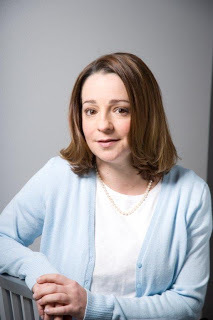
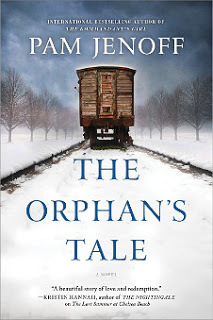
Of course I knew of Pam Jenoff and her brilliant work, but I was so happy to meet her at a book festival! She's down-to-earth, funny and you should know that this is a woman who can do the Lazy River five times in a row. And her new novel, The Orphan's Tale, set in WWII, about a traveling circus that hides Jews and the intersecting lives of two women, is both mesmerizing and heart-wrenching.
Pam Jenoff has worked in both the State Department and the U. S. Consulate in Krakow, Poland. She's a lawyer who now teaches law school at Rutgers, but more importantly (at least to me), she's the author of the international bestseller, The Kommandant's Girl, The Winter Guest, The Diplomat's Wife, The Ambassador's Daughter, Almost Home, A Hidden Affair and The Things We Cherished.
The only thing better than hosting her here would be having another dinner with her. With wine. Thank you, Pam.
What was haunting you that made you write this book?
I discovered two true stories out of Yad Vashem. One was a horrific account of a train of unknown infants, taken from their parents too young to know their own names and headed for the concentration camps. The other was of a German circus that had rescued Jews. What further fascinated me is when I was researching the circus, I discovered Jewish circus dynasties that flourished for centuries before the war. These stories twisted together to form the The Orphan’s Tale.
What was the writing like? What surprised you? What disturbed you?
I refer to The Orphan’s Tale as the book that it broke me to write, largely because of the scene with the boxcar of infants. I knew it would be the opening scene in chapter one, but I waited forever to write it. I felt that I had to metaphorically put my own three young children on the train in order to do it justice. After, I had almost a post-traumatic stress feeling and it was very hard to write anything at all.
The thing that surprised me the most was the circus. I didn’t go into this book loving the circus and I was not sure I wanted to spend a year writing about it. But ultimately I discovered that these were not circus stories, but human stories of hope and perseverance, that parallel not just ordinary life back then but also today.
What kind of a writer are you? Outline? Fly by the seat of your pen?
Total pantser (by the seat of my pants.) I have an idea, turn on the computer and go “blah” for about 60,00 words. Someone described it as, “throwing up on the page.” Then it gets unwieldy and I have to start making chapters and outlines. The editing is hell. It is the very worst way to write and I recommend it to no one, but it is the only way I can do it.
What's obsessing you now and why?
The ways in which the themes present in The Orphan’s Tale, of refuge and sanctuary and the moral responsibility we all face, have become more pressing than ever in light of the current political climate.
What question didn’t I ask that I should have?
What drives you to write about the war? I spent several years living in Poland and working on Holocaust issues and becoming close to the survivors. I regard my books as love stories to the people who lived during that most difficult and important of eras.
Published on March 30, 2017 19:00
March 21, 2017
We pause to celebrate creativity in clothing--ThackerNYC's Toni Hacker talks about inspiration, narrative in clothing design, classic films, OCD, Bette Davis, hanging out with other designers, and those indispensable clothing kits
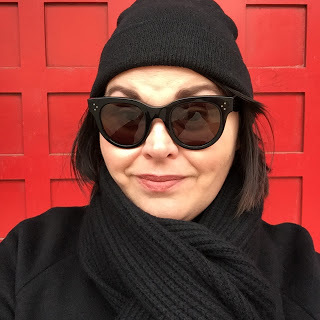 My new go-to designer for all my clothes: the brilliantly creative Toni Thacker
My new go-to designer for all my clothes: the brilliantly creative Toni Thacker Oh! The showroom!
Oh! The showroom!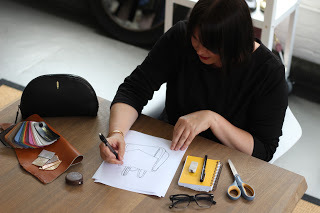 Portrait of the artist at work
Portrait of the artist at work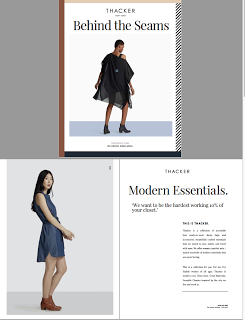 A bit about the company
A bit about the company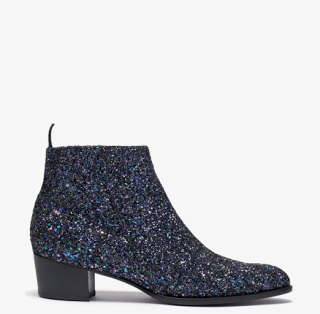 Oh black! Oh glorious shimmer!
Oh black! Oh glorious shimmer!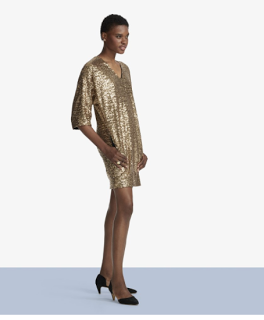 Yes, I wear all black, but I'm making an exception for this gorgeous dress
Yes, I wear all black, but I'm making an exception for this gorgeous dress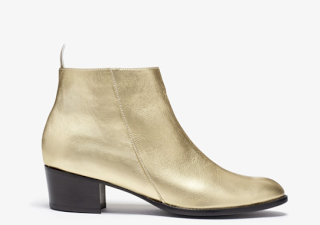 I think everyone should have these
I think everyone should have theseI always interview writers because I'm fascinated by process--by any creative process--and so I've also interviewed filmmakers, directors and clothing designers. Anyone who knows me knows that I dress in black. If there were a darker color, I'd wear it. But I also, like many women I know, have a terrible time finding clothes that speak to me, classics with just a little bit of something unique. I first saw a link, "12 black things every woman should own"--and I went nuts. Everything was perfection, including the things that were rich with color. Unusual, classic, different, and--and actually wearable! All by ThackerNYC, who is really Toni Hacker.
I promptly wrote the company to express my devotion and because I wanted to interview Ms Hacker, to see how she works and how she comes up with designs. And I plan to wear my ThackerNYC clothes on tour.
Thank you so much, Toni, for agreeing to answer my questions, and thank you even more for creating such glorious, absolutely perfect clothing.And also, the lipstick tips. I bought the Mac.
Every woman I know knows how impossible it is to find wearable won't go-out-of-style pieces that you can dress up or down. When I saw your collections, I felt they were so perfect I could not stop staring at them and yearning for them. Can you please talk about the philosophy behind these incredible clothes?
Thacker was created after years of listening to women (customers, friends, and family) vent their frustration about finding well-made, versatile wardrobe essentials that aren't boring...I was having the exact same problem finding what I was looking for in the market, even though I'm in the fashion industry. My takeaway was that women over size 12 and the age of 40 are often ignored in the contemporary market and that finding versatile, unfussy wardrobe pieces was becoming just another chore in an increasingly busy world. I decided to try and tackle the problem by creating a collection of modern-meets-classic 'forever' wardrobe pieces that work together for endless looks and that work with everything you already own. I want the brand to be the hardest working 10% of your closet that you love and reach for every day.
What I also love are the details that make a very simple piece special, like subtle blue sparkle on a dress or a gorgeous gold on a classic bootie. Where does your inspiration come from? And how do you choose the fabrics and the designs?
I love classic design, but for a piece to be truly special it has to have personality...a bit of narrative. My background is in studio art and industrial design, so I fell into fashion in sort of a sideways manner. A lot of my inspiration now, for Thacker, comes from thinking about the platonic ideal of an item and then tweaking the line, cuts, or fabric so that it feels simultaneously modern and timeless. I love unexpected details, fabrics, and color. Classic film is a huge inspiration (I live and die by the Criterion Collection), as well as art. I'm a bit of a method designer and can be seriously OCD when I'm working...I'll watch the same movie or listen to the same album repeatedly until I finish a collection. I think I do a lot of problem solving in my sleep...sometimes I dream about the collection or specific pieces and wake up to sketch them.
How did ThackerNYC get started? What are your backgrounds? The name is really fun to say, by the way!
launched Thacker in late September of 2016 after I exited my previous brand, Hayden-Harnett, in August of 2015. When I left I did some freelance design and consulting work and then decided to create a new brand dedicated to amazing, kickass women everywhere. The name, Thacker, came from abbreviating my name. It's how I sign my letters.
I also love your kits (as everyone knows I live in black and you are making dressing stress free for me!) what other kits are you thinking of?
I'd love to do a beach kit! We have some really fun pieces coming out for spring/summer 2017, including our first swimsuit and a really amazing coverup.
I am fascinated by how creative people work, especially in industries different from mine. What is a typical day or so like for you? What is the best part? The worst?
I do a lot of different things within the company (design, marketing, and graphics), so I try to be pretty scheduled with my day and work so I don't get overwhelmed. I wake up at 6, make coffee, skim my emails to reply to anything super urgent, and plan our Instagram post for the day. I just moved to Beacon, NY after living in NYC for the past fifteen years so I'm loving my new commute on the Hudson line...the river views are crazy beautiful, inspiring, and relaxing. Our office is located on the west side near Hudson Yards, and I usually get in around 10am. My day in NYC involves working with my assistant to plan social, reviewing samples and fabrics, designing graphics for our site and newsletters, and meetings. I leave the office at 5:30 and wrap up any outstanding emails on the commute home.
We writers hang out together and discuss our work-in/progress and exchange ideas all the time. Is it that way in the fashion world? And do you test drive ideas?
I think everyone in fashion is too busy to hang out! Joking...and not joking. Fashion seems glamorous, but it's a LOT of work (physically, emotionally, and mentally). You have to be a great multitasker to survive and the pace can be a bit frantic because you have to work on-calendar. Fashion folks definitely reach out to each other for help finding specific materials, or if they need help with sourcing, freelancers, web designers, photographers, etc.
I always try to personally road test what I create before it goes into the line. I have to know that it's going to work in real time, not just when you're sitting behind a desk.
What is obsessing you now and why?
Immediately, right this second, I'm obsessed with Bette Davis. I've been watching 'Feud' with Susan Sarandon and Jessica Lange...I would give anything to be on set and see those costumes and feel those laser vibes in person. Just watched Bette in 'Jezebel' last night. Classic.
What question didn't I ask that I should have?
Favorite pieces in the collection! The Ren pants, Beau blazer, Riva shirtdress, Georgina bag, and Pippin coat are absolute must-haves. Every woman should own these pieces.
Published on March 21, 2017 15:35
March 18, 2017
Jessica Strawser talks about marriage, secrets, mystery and her stunning debut, ALMOST MISSED YOU
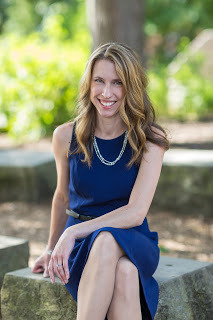
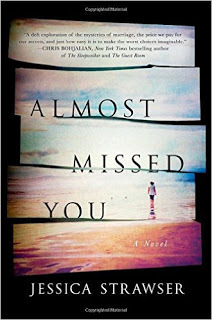
“Once in a great while, along comes a novel that defies the odds … leaving the reader both deeply moved and thoroughly astonished. ALMOST MISSED YOU is just such a book, by a writer’s writer with talent to spare. You may not have heard of Jessica Strawser today, but by tomorrow, everyone’s going to be talking about her and about this story.” —Jacquelyn Mitchard, New York Times bestselling author of The Deep End of the Ocean
Jessica Strawser is the editorial director of Writer's Digest Magazine and--my favorite--a debut novelist. I'm so honored to host her here. Thank you so much, Jessica!
I always think writers are haunted into writing their books. Was this the case for you with this one? Can you talk about it?
I suppose I do find the question of fate to be a haunting one: People talk a lot today about leaving things to the universe, about wondering if things are meant to be. Sometimes it’s hard not to wish or imagine things had turned out a different way; other times we really do thank our lucky stars. I wanted to write a story that brought these ideas to the forefront and made characters question whether they’d put too much—or too little—stock in the stories they’d told themselves (and each other).
What kind of writer are you? Do you outline, fly by the seat of your pen?
I like to try to have a general idea of where I’m going, but I can’t say I know how I’m going to get there. I write things as they come to me, when they’re most vivid, even if they’re out of order, and try to have faith that I’ll be able to fill in the blanks and pull it all together in the end. I do often wish I was more of an outliner—that seems like a far less anxiety-filled approach.
What I so deeply admired about ALMOST MISSED YOU is how you navigated three very different points of view to unfold your story--and you kept the suspense at fever pitch. How difficult was this to do? Did you ever hit any wrong turns (that you obviously corrected?)
I approached the story with the idea that we’re all unreliable narrators, to a certain extent, simply by virtue of the fact that our perspectives have limits—not to mention bias. In order to get the whole story in ALMOST MISSED YOU, we need all three perspectives: There isn’t a single character at the start of the story who knows the whole story. It was great fun trying to discern which points of view were key to reveal certain pieces and to put them all together like a puzzle. I did have some different turns in earlier drafts, but I don’t know that any of them were wrong—as the story could have been told in a number of different ways. (My next novel has a more linear structure and it’s not nearly as forgiving!)
You are the Editorial Director of Writer's Digest, the virtual Bible for writers. How did that job impact your job as an author, if at all?
Oh, goodness, how did it not? Consider that in the course of editing Writer's Digest, I’ve read each issue cover to cover no fewer than five times—that’s earnest, thorough repetition of written instruction and inspiration that has fueled my writing in ways both intentional and subconscious. Likewise, it’s made me feel a part of a community that shares a dream, from the bestsellers I’ve interviewed to the readers I’ve met at conferences or connected with online. The many conversations I’ve had for our cover stories—just think of it, forty-five minutes on the phone with David Sedaris, an hour with Alice Walker, with Lisa Gardner, with David Baldacci, with Debbie Macomber, with some of today’s most successful writers in virtually every genre—has given me access to some of the best insights into the writing life around, straight from the sources. When I close the door to my writing room every night, I don’t just remember their words—I hear their voices. Though I’m always the last one awake in my house, without fail, it makes me feel less alone.
You've been getting some amazing buzz for your novel! Does this make it easier or more difficult to write your next book because of the expectations? (Forgive me if I just added to your anxiety!)
I first turned in my next book a few months back, and am just now wrapping my revision addressing my editor’s comments, so there’s been a lot of overlap during which I’ve tried to just stay focused on whatever is in front of me, which has been one novel or the other consistently for the past 18 months, since I first received the two-book offer from St. Martin’s. I will say that writing a book under contract for the first time did bring with it an inherent pressure in the sense that people who I greatly respect—namely my editor and my agent, but also my publisher, my publicist, my marketing team, and an ever-growing list of supporters--have put their faith in me, and I don’t want to disappoint them.
What's obsessing you now and why?
Sleep—I’m getting less and less of it these days! Though with a five-year-old and a three-year-old, they are the focus of my energy and my joy most every “free” hour of the day. Recently my youngest has reached an age where she has the attention and the grasp of enough basic rules that we can begin to enjoy family game nights, and all four of us are loving this new phase. It’s the simple things: to light a fire and settle in with a silly deck of cards, or Connect Four, or this hilarious Horton Hears a Who game we got for Christmas. Even at this early stage I can recognize how fleeting these days are, when mom and dad are the preferred Friday night companions, no arm twisting involved, and I soak them up as best I can.
Published on March 18, 2017 14:07



